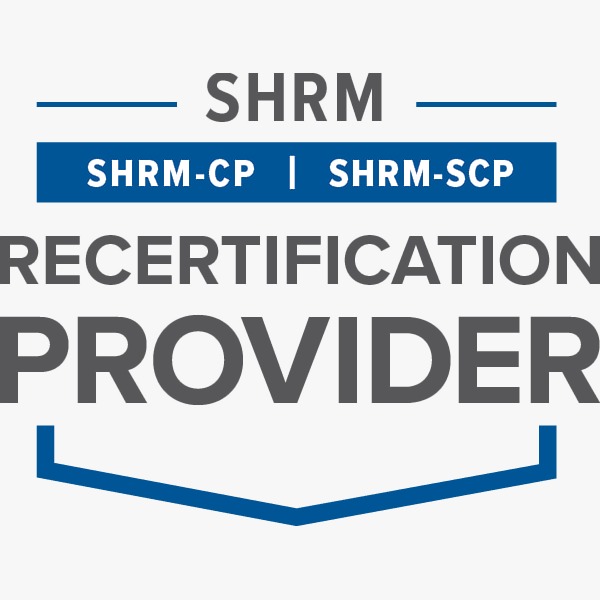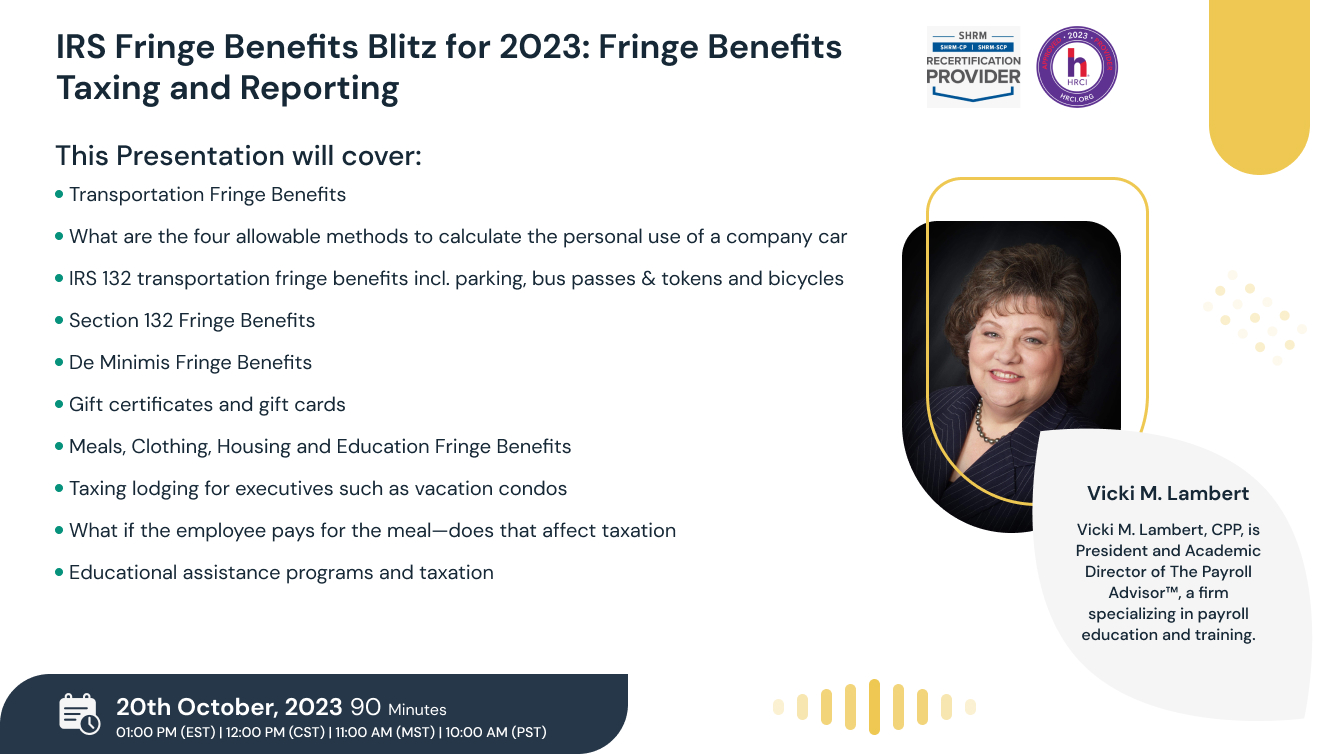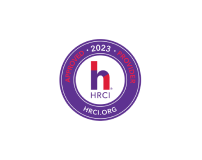Overview:
Let’s face it… complying with the Internal Revenue Tax Code requirements and federal regulations for fringe benefits such as relocation, meals, lodging, educational assistance, health insurance, transportation and third-party sick pay can be complicated. The taxation and reporting for these fringe benefits offered by many companies today are major components of a payroll department’s responsibilities. And with the IRS looking for consistency of treatment—you can’t afford to make a mistake.
As a payroll professional you must know cold—no guessing—when a fringe benefit is taxable and when it is not, when it is reportable and when it is not. Payroll must know when providing a fringe benefit must be considered wages or if it is “tax free”. What if the employee pays some of the cost of a fringe benefit? How does that affect taxing and reporting? Are there dollar limits? Does it become taxable after a certain amount? And after you have mastered all the facts along comes a new tax bill by Congress that can change everything you just learned when it comes to taxing fringe benefits.
All fringe benefits must be handled correctly, under the latest rules, to minimize the chance for penalties and interest to be levied against your company or for triggering larger and more intrusive governmental audits.
What You will Learn:
-Transportation Fringe Benefits
-What are the four allowable methods to calculate the personal use of a company car
-How to calculate the taxable wages for the personal use of a company vehicle
-When an auto allowance is considered taxable wages and when it is not
-IRS 132 transportation fringe benefits including parking, bus passes and tokens and bicycles
-Calculating the personal use of a company aircraft even if there is a business trip involved
-Section 132 Fringe Benefits
-Working Condition Fringe Benefits
-De Minimis Fringe Benefits
-Employee Discounts
-No additional cost services
-Employee Achievement Awards for Length of Service and Safety-the changes
-Prizes and Awards—Cash and Noncash
-Cell phones
-Gift certificates and gift cards
-Holiday gifts
-Meals, Clothing, Housing and Education Fringe Benefits
-The changes to employer provided relocation under the Tax Cuts and Jobs Act of 2017
-On-site lodging taxation and reporting
-Taxing lodging for executives such as vacation condos
-Providing meals for employees—is it taxable or not?
-Are the rules different for on-site cafeterias
-What if the employee pays for the meal—does that affect taxation
-What to do with occasional meals
-Educational assistance programs and taxation
Why You should Attend:
Fringe Benefits are an important component for recruiting and keeping high quality employees in today’s business world. But the diversity of available fringe benefits can make the area of payroll compliance positively overwhelming!
Participants with walk away with a better understanding of the IRS view on fringe benefit taxation. The details of the IRC exceptions allowed by the IRS will be detailed and explained to participants. Companies are providing more fringe benefits to employers more than ever before, thus reduces company cost but raises employee morale. Because of this the IRS has more to say on what Fringe Benefits are taxable and what are not. The IRS for non-taxable fringe benefits puts a lot of regulation around how the fringe benefit is given and when that also determines if a thought non-taxable item may end up being taxable.
Who Should Attend:
-Payroll Executives/ Managers/ Administrators/ Professionals/ Practitioners
-Human Resources Executives/ Managers/ Administrators
-Accounting Personnel
-Business Owners/ Executive Officers/ Operations and Departmental Managers
-Lawmakers
-Attorneys/ Legal Professionals
-Any individual or entity that must deal with the complexities and requirements of Payroll compliance issues

Vicki Lambert
Vicki M. Lambert, CPP, is President and Academic Director of The Payroll Advisor™, a firm specializing in payroll education and training. The company’s website www.thepayrolladvisor.com offers a payroll news service which keeps payroll professionals up-to-date on the latest rules and regulations.
With nearly 40 years of hands-on experience in all facets of payroll functions as well as over three decades as a trainer and author, Ms. Lambert has become the most sought-after and respected voice in the practice and management of payroll issues. She has conducted open market training seminars on payroll issues across the United States that have been attended by executives and professionals from some of the most prestigious firms in business today.
A pioneer in electronic and online education, Ms. Lambert produces and presents payroll-related audio seminars, webinars, and webcasts for clients, APA chapters, and business groups throughout the country. Ms. Lambert is an adjunct faculty member at Brandman University in Southern California and is the creator of and instructor for their Practical Payroll Online program, which is approved for recertification hours by the APA. She is also the instructor for the American Payroll Association’s “PayTrain” online program also offered by Brandman University.

SHRM -
StandEagle is recognized by SHRM to offer Professional Development Credits (PDCs) for the SHRM-CPSM or SHRM-SCPSM. This program is valid for 1.5 PDCs for the SHRM-CPSM or SHRM-SCPSM. For more information about certification or recertification, please visit - portal.shrm.org.

HRCI -
This webinar has been approved for 1.5 HR (General) re-certification credit hours toward California, GPHR, HRBP, HRMP, PHR, and SPHR recertification through the HR Certification Institute.
The use of this seal is not an endorsement by the HR Certification Institute of the quality of the activity. It means that this activity has met the HR Certification Institute’s criteria to be pre-approved for re-certification credit.

ACCREDITATIONS


